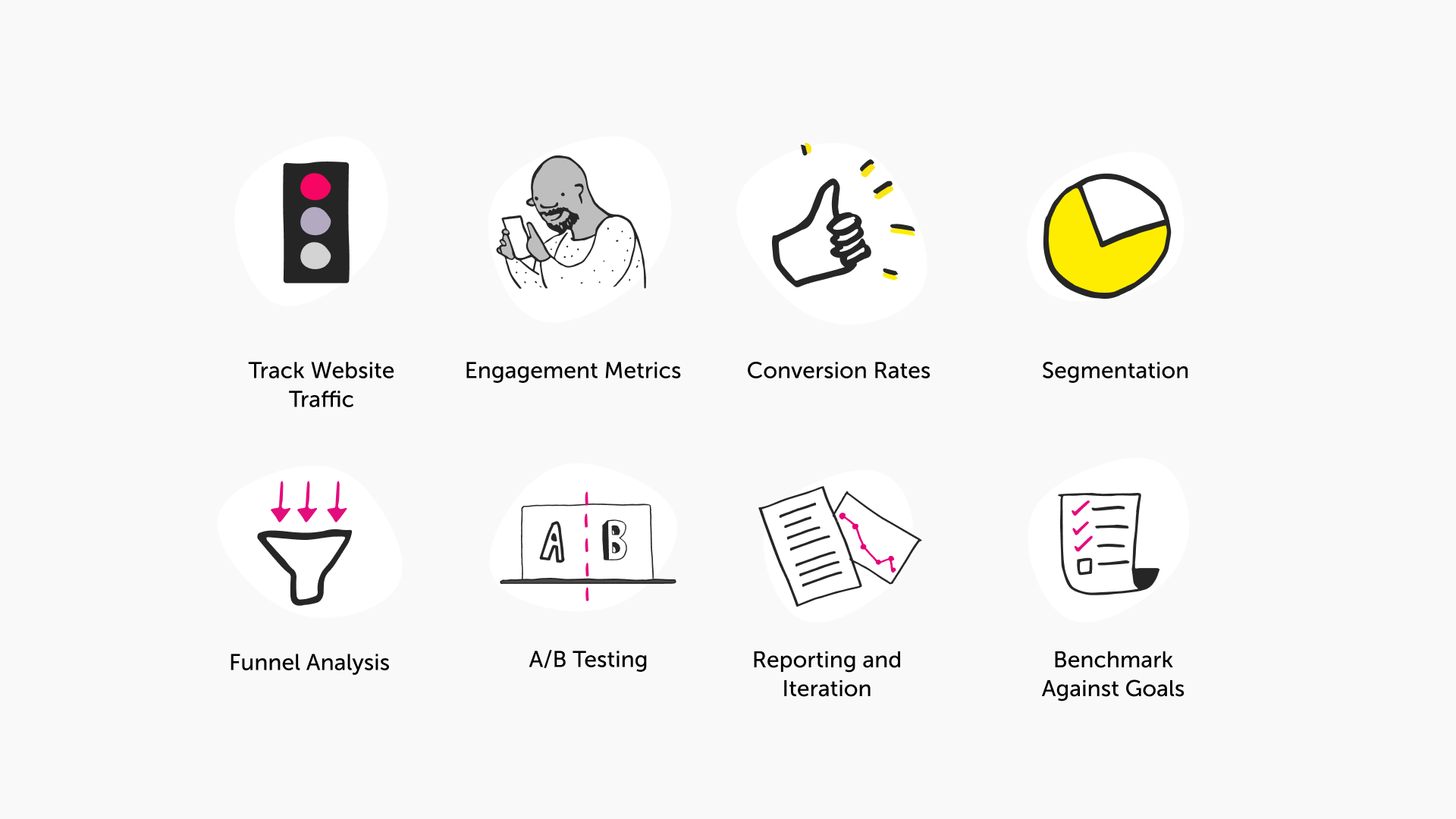
Keyword research is the cornerstone of a successful digital marketing strategy. In the ever-evolving landscape of digital marketing, staying ahead of the curve is crucial. Algorithms and user preferences change frequently, making it essential to harness the power of keyword research.
If you have noticed a dip in the performance of your website organically, or just want to increase your online audience a strong content market strategy could be the answer.
In this comprehensive guide, we will delve deep into the world of keyword research in digital marketing. We’ll explore why keyword research is vital, how to conduct it effectively, and how to turn your findings into a robust content marketing strategy.
Why is Keyword Research Important in Digital Marketing?
Keyword research is the heartbeat of digital marketing. It’s not just about finding words; it’s about understanding your audience, predicting their needs, and crafting content that resonates with them:
- Use the language of your users: Keywords play a pivotal role in guiding both search engines and users to your content in the vast sea of the internet. By using keywords you are using the language of your users to ensure that you connect with them on their level.
- The power of user intent: Effective keyword research helps you decipher what users are looking for. This knowledge enables you to create content that precisely matches their queries, leading to higher user satisfaction and engagement.
- Boosting search engine rankings: When done right, keyword research can be the catalyst for higher search engine rankings. By optimising your content with relevant keywords, you improve its visibility and increase organic traffic to your site.
- Content marketing success: Keyword research is the key to crafting a successful content marketing strategy. It ensures that your content is aligned with what your target audience is searching for, leading to higher conversion rates and ultimately, business success.
Understanding Keywords
Before we dive deeper into keyword research, let’s establish a solid foundation by understanding the different types of keywords:

- Short-Tail Keywords (Head Keywords): These are concise one- to two-word keywords like “shoes” or “travel.” They are broad in nature and capture the essence of a topic without delving into specifics. However, they are highly competitive and challenging to rank for.
- Long-Tail Keywords: Long-tail keywords are more specific and comprise three or more words. Examples include “running shoes for women with high arches.” While they may have lower search volumes individually, they often convert better and collectively make up a significant portion of organic traffic.
- Informational Keywords: These keywords start with phrases like “how to,” “what is,” or “tips for.” Examples include “how to bake a cake” and “what is climate change.” Content optimised for informational keywords aims to provide informative and educational content that addresses user queries.
- Sales Keywords: Sales keywords are used by users ready to make a purchase. They include terms like “buy,” “order,” “discount,” or brand names. Examples include “buy iPhone 13” and “Nike shoe discounts.” Content optimised for sales keywords focuses on product descriptions and sales offers to convert users into customers.
The Power of Keyword Variability
Effective content marketing involves incorporating a mix of these keyword types into your strategy:
- Short-tail keywords help you reach a broad audience.
- Long-tail keywords allow you to tap into niche markets.
- Informational keywords establish your authority and resourcefulness.
- Sales keywords drive conversions and revenue.
For content marketing, it is important to create a content strategy with a combination of keyword types. When launching a new product or service, the lower competition keywords will build traffic to your website in the short term. Once you have given your content time to bed in, this is when you will start to see the benefit of the higher competition terms. Combining keywords like this will allow you to have some early success, whilst ensuring long-term efficiency of the content.
It is also important to consider the split of sales and informational terms in your content strategy. Utilising sales keywords on your product or service page generates highly relevant and targeted traffic for those pages. This traffic will be easier to convert as they are already looking to make a purchase.
Creating a content pipeline from informational keywords through your blog is how you will capture your users at the consideration phase. This type of traffic will have a lower conversion rate, but will generate a secondary funnel of traffic to your service/product page that will provide additional conversions.
How to Conduct Keyword Research
Keyword research is a systematic process that forms the foundation of your digital marketing strategy. Let’s break down the steps to conduct effective keyword research:
- Define Your Goals and Objectives: Start by clarifying your objectives. Are you looking to boost organic traffic, increase sales, or establish authority in your niche? Having clear goals guides your keyword selection and content strategy.
- Identify Your Target Audience: Understanding your audience is paramount. Create detailed buyer personas to gain insights into your ideal customers’ demographics, interests, pain points, and search behaviour. This information will help you choose keywords that resonate with your audience.
- Brainstorm Seed Keywords: Seed keywords are the initial ideas that represent your content’s main topics. Begin by brainstorming a list of seed keywords that are relevant to your business or industry. These will serve as the foundation for your keyword research.
- Use Keyword Research Tools: Keyword research tools are invaluable for finding relevant keywords and analysing their potential. Some popular options include Google Keyword Planner, SEMrush, Ahrefs, Moz Keyword Explorer, and Ubersuggest. These tools provide data on search volume, competition, and keyword variations.
Keyword Analysis
Keyword analysis and content marketing combine meticulous examination of selected keywords to uncover valuable insights that inform content creation and optimisation strategies:
- Understanding User Intent: By grasping what users are looking for, content creators can tailor their materials to provide precise solutions or information, enhancing user satisfaction and engagement.
- Competitive Assessment: Keyword analysis helps gauge the competitiveness of chosen keywords. Marketers can decide which keywords to focus on by considering factors like keyword difficulty and competitor content strength. This ensures effective allocation of resources and competing in spaces where you have a chance to rank.
- Content Optimisation: Using keyword analysis, marketers can improve their current content or create new content that appeals to search engines and users. This involves strategically incorporating keywords into titles, headings, body text, and meta descriptions to improve visibility and relevance.
- Identifying Trends and Opportunities: Keyword analysis allows marketers to identify emerging trends and capitalise on them. Staying ahead of the curve can help you become an authority in your niche and tap into fresh streams of organic traffic.
- Enhancing ROI: Effective keyword analysis ensures that you’re investing resources in areas that yield the highest return on investment.
At this point, you will have a curated list of keywords to target, that are relevant to your business offering. They will have a combination of short and long-tail terms, with mid-low competition levels. Allowing you to maximise return for your content.
How to use Keyword Research for Content Marketing
By harnessing the insights derived from keyword research, you can create a targeted and effective content plan that resonates with your audience:
- Keyword Selection and Prioritisation: Start by selecting the most relevant keywords from your research. These keywords should align with your business goals and target audience.
- Create an Editorial Calendar: Once you have your keywords, build an editorial calendar around them. Plan the topics and types of content (blog posts, videos, infographics, etc.) that will address these keywords. Organise your content into a strategic timeline, ensuring consistency and relevance.
- Content Ideation and Creation: Use your chosen keywords as inspiration for content ideas. Develop high-quality, informative, and engaging content that caters to user intent. Strive for originality and uniqueness to stand out in the crowded digital space.
- Optimise On-Page SEO: Integrate your selected keywords naturally into your content. Place them in titles, headings, and throughout the body of your content. Optimise meta descriptions, image alt tags, and URLs with relevant keywords. Ensure that your content provides comprehensive and valuable information related to the keywords.
- Content Promotion and Distribution: Creating great content is just the first step. Promote your content through various channels, including social media, email marketing, and paid advertising. Leverage influencer partnerships and outreach to maximise content visibility and reach a broader audience.
- Address User Intent: Remember that keywords are not just words; they represent user intent. Ensure that your content addresses the specific needs, questions, and pain points of your target audience. Crafting content that genuinely helps or informs users will lead to higher engagement and trust.
Measuring the Success of Your Content Marketing Objectives with Analytics
Good content marketing involves more than just making and sharing content. It also involves using data to assess the impact of your work and improve your strategy for better outcomes. Analytics tools play a pivotal role in this process by providing insights into the performance of your content.

Consider what you will measure and how it fits into your Analytics Measurement Plan for your website. Start by defining key performance indicators (KPIs) that align with your content marketing objectives. Common metrics include website traffic, engagement rates (likes, shares, comments), conversion rates, bounce rates, and click-through rates (CTR).
- Track Website Traffic: Analyse the volume and sources of website traffic generated by your content. Tools like Google Analytics offer data on the number of visitors, page views, and the duration of visits. Observe trends and identify which pieces of content drive the most traffic.
- Engagement Metrics: Measure the level of audience engagement with your content. Track social media interactions, comments, and shares to understand how well your content resonates with your target audience.
- Conversion Rates: Assess how effectively your content leads to desired actions, such as newsletter sign-ups, product purchases, or form submissions. Conversion tracking enables you to evaluate the tangible impact of your content.
- Segmentation: Segment your audience to gain deeper insights into their behaviour. Analyse how different audience segments interact with your content, allowing you to tailor future content to specific demographics or interests.
- Funnel Analysis: Track the user journey from initial content engagement to conversion. Funnel analysis helps identify drop-off points and areas for optimisation in your content marketing funnel.
A/B Testing: Conduct A/B tests to compare different variations of content, headlines, or calls-to-action. Analytics can reveal which versions perform better and inform your content optimisation strategy. - Reporting and Iteration: Regularly generate reports and analyse trends in your content performance. Use these insights to refine your content marketing strategy. Focus on what works and adjust or eliminate content that underperforms.
- Benchmark Against Goals: Compare your actual results to the goals you set for your content marketing campaign. Assess whether you’re on track to achieve your objectives or if you need to make adjustments.
Content marketing is a long-term game. Be patient and consistent. Over time, your content library will grow, and your authority in your niche will increase. This leads to higher search engine rankings, more organic traffic, and a stronger brand presence.
Common Mistakes to Avoid
Keyword research is a crucial step in content marketing, but it’s easy to stumble into common pitfalls that can hinder your strategy’s effectiveness. Here are some key mistakes to avoid when conducting keyword research:
- Ignoring User Intent: Focusing solely on search volume without considering user intent can lead to irrelevant traffic. Ensure your chosen keywords align with the goals and needs of your target audience.
- Neglecting Long-Tail Keywords: Don’t overlook long-tail keywords. While they may have lower search volumes individually, they often convert better and collectively make up a significant portion of organic traffic.
- Keyword Stuffing: Overusing keywords in your content can hurt readability and SEO. Instead, aim for natural integration that enhances the user experience.
- Neglecting Competitive Analysis: Not assessing keyword competition can lead to targeting overly competitive keywords or missing out on valuable opportunities. Analyse your competitors to identify keywords where you can compete effectively.
- Not Updating Your Strategy: Keyword trends evolve. Failing to adapt to changing search behaviours and trends can result in outdated content that loses relevance.
- Relying Solely on Tools: While keyword research tools are essential, they should complement, not replace, human judgment. Use your expertise to interpret data effectively.
- Not Monitoring Performance: Keyword research doesn’t end once you’ve implemented keywords. Regularly monitor keyword performance and adjust your strategy based on data insights to stay competitive.
- Keyword Quantity Over Quality: Prioritising the quantity of keywords over quality can lead to unfocused and ineffective content. Concentrate on delivering value and relevance to your audience.
Avoiding these common keyword research mistakes ensures that your content marketing strategy is grounded in data-driven decisions, user-centric content, and adaptability to changing online landscapes. By taking a thoughtful and strategic approach to keyword research, you can maximise the effectiveness of your content marketing efforts and achieve better results.
How can we help?
In conclusion, mastering keyword research is your path to digital marketing success. It’s the key that unlocks higher search engine rankings, increased organic traffic, and stronger connections with your target audience. Ready to elevate your content strategy and boost conversions? Reach out to us today!
We drive commercial value for our clients by creating experiences that engage and delight the people they touch.
Email us:
hello@nomensa.com
Call us:
+44 (0) 117 929 7333




